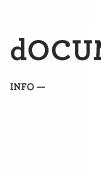Frank Ruda: Why Does One Need to Think the Unthinkable? A Materialist Response
Under the direction of the German philosopher Christoph Menke and in collaboration with Chus Martínez, the seminar What is Thinking? Or a Taste that Hates Itself is a series of twelve two-part sessions focusing on the relationship between art and philosophy, between thinking and perceiving. It is an attempt to address the questions and the methods of philosophy for those who are curious but not necessarily close to the field. Each session is divided into a public lecture every Monday evening in the Ständehaus, followed by a more intimate discussion seminar on Tuesday mornings in the Zwehrenturm of the Fridericianum.
In September 1959, the philosopher Theodor W. Adorno gave a lecture on the occasion of documenta 2. A few days earlier, he had mentioned in a letter to Max Horkheimer his interest in visiting the exhibition, in seeing what culture—art—could do after the greatest collapse that the country and the world had ever experienced. This lecture, "The Idea of New Music” (Die Idee der neuen Musik), is of key significance to dOCUMENTA (13). It is read and commented upon by Albrecht Wellmer at the opening of the exhibition and by Carla Harryman at the end, as the inspiration and source for a reflection on the importance of deeds, like art, and thoughts, like philosophy, that are less driven by aims and results, than guided by values.
The What is Thinking? seminar is a rigorous meditation on language, on meaning, on the limits and possibilities of skepticism, on imagination as the ground for social democracy, and on art and experience. It aims to contribute to an understanding of the importance of an art exhibition with the history and tradition of documenta, as a crucial space for the community to respond to questions of ethical and aesthetic significance.
The seminar sessions can be attended individually or in full. Texts and other materials for the sessions are available online.
Fridericianum (Zwehrenturm)
Text(s):
Jean Paul Sartre, “Cartesian Freedom" on Literary and philosophical essays, translated by Annette Michelsen, New York: Collier Books, 1962, pp. 180-197.
Frank Ruda is a philosopher and Research Associate at the Collaborative Research Centre on Aethetic Experience and the Dissolution of Artistic Limits at the Free University of Berlin, Germany. Since 2011 he is a guest professor at the Institute of Philosophy, Scientific Research Centre in Ljubljana. Among his recent publications is Hegel's Rabble: An Investigation of the Hegelian Philosophy of Right (2011).

















